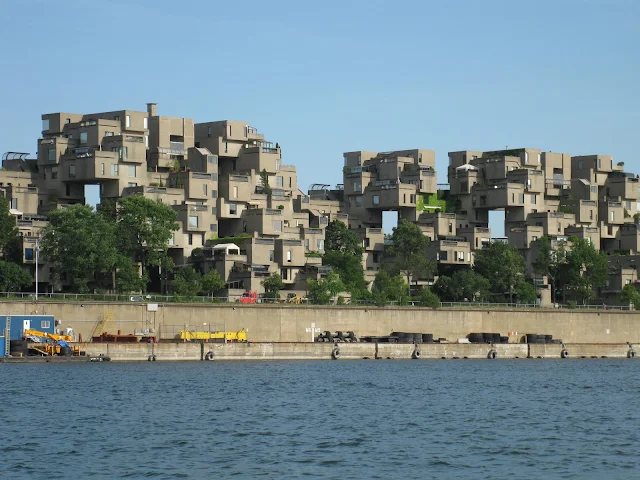Showing posts with label Expo 67. Show all posts
Showing posts with label Expo 67. Show all posts
Friday, August 23, 2024
Thursday, February 24, 2022
Habitat 67
I mentioned the dedicated bus service to Habitat 67 in the last post. Habitat 67 was constructed for Expo 67 (see https://en.wikipedia.org/wiki/Expo_67), the incredibly successful World's Fair held in Montreal in 1967. I am not sure Habitat was popular at first, it was isolated and needed a special bus service for the residents. It may also have been cold and wind swept in the winter. Habitat is idiosyncratic in design but no one lives there who doesn't appreciate the architecture of the place, that is its special quality; it is a design for the future: high density living but privacy for the residents.
These photographs were taken in 2011 during a boat ride from the port in Old Montreal.
Wednesday, December 5, 2012
Buckminister Fuller's geodesic dome at Expo 67
 |
Here is a view of Buckminster Fuller's geodesic dome--this was the American pavilion at Expo 67--seen here from the South Shore. In the eyes of many, Expo 67 was the last expression of Montreal's greatness; money is conservative and business avoids political unrest. With the popularity of Quebec separation from Canada, many head offices left the province. Expo was followed by the summer Olympics in 1976... Montreal was still on a roll, but native Montrealers remember the Olympics because of corruption, the Olympic stadium cost about $1B and it wasn't paid off until the early 2000s. Later that same year, on November 15, 1976, the Parti Quebecois was elected to power and with it economic decline began in earnest. The PQ represented different things to different people, to English-speaking Quebec it represented ethno-centricity and the oppression of the English-speaking community. However, most English-speaking Quebeckers accepted the new order of things in Quebec, they recognized that the status quo could not continue, that the French-majority should be masters in their own province. The English-speaking population that didn't accept how things had changed (approximately 200,000 people) left the province for life in Toronto, Calgary, and Vancouver. For the French-speaking majority it was a time for independence, guaranteeing the future of the French language and culture in Quebec, it was a time to celebrate.
Subscribe to:
Comments (Atom)



.JPG)
.JPG)
.JPG)
.JPG)
.JPG)
.JPG)
.JPG)
.JPG)
.JPG)









